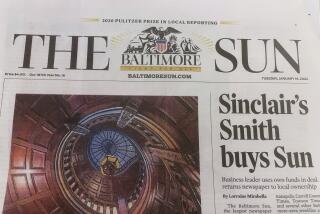Murdoch Recasts the Establishment’s Newspaper : Times of London: Again an Upstart at Age 200
- Share via
LONDON — The Times of London, perhaps the world’s most famous daily newspaper and one of its best, marked its bicentenary Tuesday, less “the Thunderer” of a former era than the conservative voice of a rising, prosperous English generation.
Both authoritative and zany over the years, the Times until recently presented its readers with subdued, serious front pages--emphasizing British domestic and foreign news over the disasters and spicy scandals of competing papers.
It was also distinguished by its letters to the editor--both from the world’s movers and shakers writing on the issues of the day and from rural hobbyists or doting grandmothers, pouring out enthusiasm over a species of butterfly or the treatment of pets.
But the Times and its sister paper, the livelier Sunday Times, were losing money in the 1970s and early 1980s, and in February, 1981, the group was bought by Australian newspaper magnate Rupert Murdoch. The man who also publishes the sensationalized New York Post and the National Star in the United States, Murdoch set out to increase falling readership by entertaining as much as informing.
To the annoyance of some of its traditional readers, the Times has taken on a new and brighter look. Headline and picture sizes have been enlarged and news stories made simpler in pursuit of readability.
There is more emphasis on features, and even a game with cash giveaways. U.S. readers of Murdoch papers are familiar with the bingo-like games in the New York Post and Chicago Sun-Times.
“After 200 years of unstinting effort to avoid anything that might bring a hot flush to the cheeks of its readers, the Times is becoming aware,” said Derek Jameson, a former Fleet Street editor.
“Times readers are considerably younger than the national average,” Editor Charles Douglas-Home, nephew of former British Prime Minister Alec Douglas-Home, said at a recent news conference.
Founded as the Universal Daily Register nine years after the American Revolution, the Times had an initial circulation of 1,000. Facsimiles of Issue No. 1 one will be distributed with the newspaper today.
The old Times owed its independence and power to its founder, John Walter, a former coal merchant and insurance broker. He hired two German engineers to build the world’s first steam press, enabling his paper to print more and later and faster--thus dominating an emerging market.
This technological edge, together with editorial independence, nonpartisan reporting and its own foreign staff, gave the Times luster. Its editorial page, which wielded the power to topple governments, gave it the nickname “the Thunderer” in the 19th Century.
One editor, John Thadeus Delane, said the Times represented no political side but held itself responsible “to the people of England for the accuracy and fitness of that which we think proper to publish.”
The Times became the voice of the British Establishment, conservative if often eccentric. Douglas-Home, dismissing criticism of the bingo game, which is based on stock market prices, said the reaction is nothing compared to the outrage of the 1930s, when the Times introduced its now-highly popular crossword puzzle.
Today’s Times of London seems financially more secure than a few years ago, when it was crippled by strikes and a lockout lasting 11 months, as workers balked at computerized typesetting technology.
The format and editorial changes have given the paper a bigger readership and trimmed the group’s once formidable losses.
Director M.H. Hussey predicted that the anniversary hoopla will boost circulation to more than 500,000, from its present 464,000. The Times sold fewer than 300,000 papers a day when Murdoch bought the papers, a handful of supplements and a book-publishing subsidiary for $20.7 million.
Editors insist that Murdoch does not interfere with their judgment. Still, one recent ousted editor, Harold Evans, now editorial director of U.S. News & World Report, says the press baron manages to project “an aura.” Evans--himself a popularizer during his brief Times editorship--said a few months ago that the paper under Murdoch has “accepted a greater popularization than I would have tolerated.”
Is the Times still Britain’s newspaper of record? Douglas-Home insists that it is, even though it sometimes omits or plays down important stories.
“We provide a record of the world around us,” he said, “so that the student of contemporary history will be able to see how it was.”
More to Read
Sign up for Essential California
The most important California stories and recommendations in your inbox every morning.
You may occasionally receive promotional content from the Los Angeles Times.













